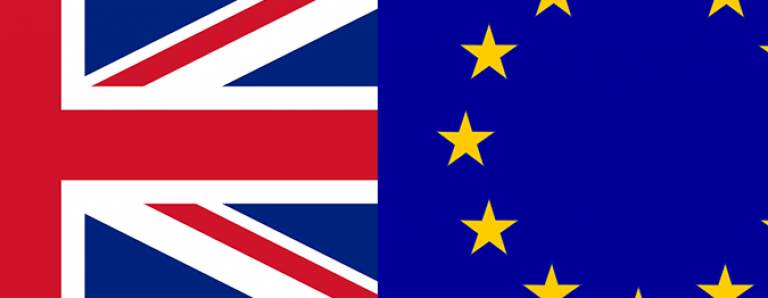Over 250 senior academics criticise deliberate campaign misinformation in EU Referendum
14 June 2016

A group of over 250 academics have signed an open letter in the Telegraph to criticise the deliberate misinformation circulated by campaigners on both sides of the Brexit debate, and express serious concerns about the effects on the public's ability to make an informed choice on 23 June.

The letter was co-ordinated by referendum expert Dr Alan Renwick, Deputy Director of the UCL Constitution Unit, and his colleagues, and has been signed by academics in politics, constitutional law, economics and beyond from universities across the UK. A full list of signatories is given below, and the letter remains open for other academics to add their names.
If you are an academic member of staff in the Politics, Law or Economics department of a UK university and would like to add your name in support of the letter please send a message from a university e-mail address to constitution@ucl.ac.uk using "EU referendum letter" in the subject line and providing your full details. Your name will be added to this page.
The full text is as follows:
A referendum result is democratically legitimate only if voters can make an informed decision. Yet, the level of misinformation in the current campaign is so great that democratic legitimacy is called into question.
Both sides are making misleading claims. Their official communications have been dropping through letter boxes - at taxpayers' expense - in recent days. Vote Leave's leaflet purports to offer "The Facts", yet leads with the claim that EU membership costs the UK £350 million a week - repeatedly exposed by independent authorities as a blatant falsehood. The Remain leaflet begins by saying that "over 3 million UK jobs are linked to our exports to the EU". Though this is in line with independent analyses, not all these jobs would go in the event of Brexit.
Propagating falsehoods, with support from the public purse, distorts the public communication upon which democracy depends. When the dust from this referendum settles, we must review means of strengthening campaign truthfulness without curtailing legitimate free speech.
In the short term, broadcasters and the media must focus more fearlessly on challenging deliberate misinformation from both sides. Impartial fact-checkers - at the BBC, Channel 4, Full Fact, the UK in a Changing Europe initiative, and elsewhere - are doing excellent work, but are receiving insufficient attention. As the campaign draws to a close, an informed public decision true to the values of British democracy depends on a change of tone.
The public letter follows earlier interventions by Dr Renwick, including a blogpost and BBC TV appearance (at 08.55), drawing attention to the lack of regulation of campaign claims in the referendum. He pointed out that some other countries have official bodies which regulate referendum campaign truthfulness. In contrast, Britain's EU referendum has seen misinformation circulated to every household with support from the public purse. The academic letter calls for this situation to be reviewed after the referendum, but also for a more determined focus by media outlets on truthfulness in the closing week.
Dr Renwick said: ''This referendum asks voters to make one of the most important decisions in the UK's democratic history. But the cacophony of misinformation - including that coming from the official campaigns - means many voters are likely to base their choice on beliefs about the effects of EU membership or Brexit that are simply wrong. That subverts the whole democratic purpose of the referendum and could be a tragedy for the country's future.''
The UCL Constitution Unit has held a series of events on the constitutional consequences of Brexit, seeking to provide objective evidence-based debate to inform decision-making. These were supported by the UK in a Changing Europe initiative, which has sought to do the same more broadly during the campaign.
On 16 June at 6pm the Constitution Unit hosts a major debate 'To Remain or to Leave?', with four leading speakers whose claims will be checked by an expert academic panel. The main speakers are Chuka Umunna and Laura Sandys (for Remain) and Jacob Rees Mogg and Peter Whittle (for Leave). The event will be live web cast here.

The chair of the event Professor Meg Russell, Director of the Constitution Unit, said "From the outset we have planned our UCL debate to encourage sound evidence-based claims from the two sides of the campaign which are objectively checked by experts in order that the audience receives reliable information. It is a shame that this same principle has not applied to the wider referendum campaign."
You can see all the signatories to the letter here.
If you are an academic member of staff in the Politics, Law or Economics department of a UK university and would like to add your name in support of the letter please send a message from a university e-mail address to constitution@ucl.ac.uk using "EU referendum letter" in the subject line and providing your full details. Your name will be added to this page.
Tweet Close
Close


